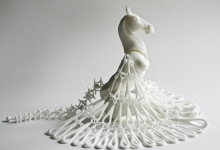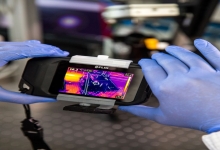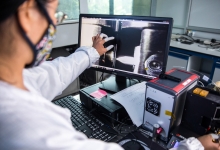National programmes
The National Programmes portfolio supports national and continental research and development initiatives at research organisations, higher education institutions (HEIs), and stakeholders in the public and private sectors that are active in the research, development and utilisation of photonics-based technologies. The National Programmes portfolio hosts four programmes, namely the African Laser Centre (ALC), Collaborative Programme in Additive Manufacturing (CPAM), Photonics Prototyping Facility (PPF) and Laser Rental Pool Programme.
African National Laser Centre
The ALC is a New Partnership for Africa's Development (NEPAD) flagship initiative and is funded by the Department of Science and Innovation (DSI) through its Africa Multilateral Cooperation programme. The centre was launched at the Ministerial NEPAD summit in Johannesburg, South Africa, in November 2003. It is a virtual organisation that brings together researchers from across Africa in the fields of lasers and spectroscopy.
The ALC was started as a fledgling programme within the CSIR National Laser Centre (NLC) and is aimed at encouraging research collaborations between African researchers, and facilitating researcher and student exchanges between African institutes that are active in photonics-based research. Based on funding made available by the DSI, the ALC in South Africa supports four programmes, which are the ALC Research Collaboration Programme, the ALC Scholarship Programme, the ALC Training Programme and the ALC Knowledge Exchange Programme.
Collaborative Programme in Additive Manufacturing
The CPAM aims to increase the manufacturing readiness of additive manufacturing, which will lead to the adoption and utilisation of additive manufacturing as an accepted and viable advanced manufacturing technology. The programme focuses on supporting research, development and innovation in additive manufacturing at South African research institutions, in cooperation with industrial partners. The CPAM focuses on four main themes, namely the qualification of metal additive manufacturing for industrial applications, a design-for-additive manufacturing programme, an industrialisation of polymer additive manufacturing programme and an industry development programme.
Photonics Prototyping Facility
The PPF is a prototype development facility that supports the development of photonics-based prototypes for market evaluation and testing. Through the facility, stakeholders have access to the dedicated facilities and skills that support the development of photonics-based product prototypes. The purpose of the PPF is to support and stimulate the growth of the South African photonics industry by providing the opportunity to develop technologies to a point of market readiness.
The facility was established by the CSIR and is funded by the DSI. The PPF works closely with industry partners to support the development of photonics-based product prototypes to enable and stimulate the growth of the South African photonics industry, increase its competiveness, and support the growth of enterprises and associated job creation through the expansion of the photonics industry’s product portfolio.
Laser Rental Pool Programme
The CSIR has access to an extensive equipment base in the field of photonics, specifically laser sources, photonics-based diagnostics and ancillary equipment that can be used to enable photonics and photonics-based application research and development programmes. The CSIR Laser Rental Pool programme was established in the year 2000, and provides the laser and ancillary equipment required for laser and laser application-related research at South African HEIs. The CSIR Laser Rental Pool programme is funded by the DSI, and provides researchers at HEIs access to state-of-the-art equipment, based on a strong research programme motivation. Through the programme, scientific, engineering and technical support is available to researchers to support the equipment required for their research projects. The programme focuses on supporting laser-related research in all research fields in the natural, engineering and health sciences fields, and strongly encourages collaborative research among different institutions. The fund allows access to equipment for use at the host institution of applicants, as well as access to equipment housed at facilities of the CSIR NLC.






